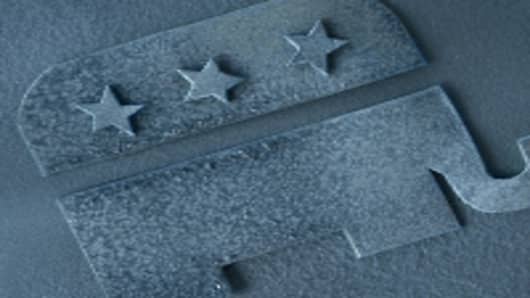In the final weeks of the 2010 U.S. midterm elections, Steven Law began to single out vulnerable Democrats in Congress from the Washington headquarters of American Crossroads, the Republican campaign group.
From a nondescript office building near the White House, he and his colleagues helped marshal like-minded conservative organizations while tracking the areas where the official Republican campaign was light, in readiness to maximize the impact of last-minute attacks on Democrats.
“We were able to sit down with groups that had significant resources and we just divided up all the targets,” said Mr. Law, the group’s chief executive, adding that in the end “we stretched their defensive perimeter beyond the breaking point.”
Those elections, which saw Republicans sweep the House of Representatives, were a low-key warm-up compared with what Crossroads has planned for the 2012 presidential and congressional elections.
With $100 million in the bank already for the 2012 cycle, Crossroads is the largest and most feared of the new kind of campaign group unleashed by a series of court decisions removing all limits on cash donations for spending on elections.
In this year’s presidential, Senate and House elections, the super-political action committees, or super-Pacs, such as Crossroads have the firepower to swing a crucial state or seat.
“They can get 20 guys around a table and say, ‘We can win this seat if we spend $20 million, and I’d like you all to put in one million dollars each.’ It changes the whole dynamic,” said a prominent Republican fundraiser.
More than that, the group conceived by Karl Rove and Ed Gillespie, two veteran Republicans who both worked for George W. Bush, is envisaged as a model for a permanent campaign organization beyond single election cycles.
“Our model was, let’s build something that will last longer than a particular issue or cause or cycle, and let’s run it a lot more like a business that most of our donors are familiar with,” said Mr. Law.
Like most such groups, Crossroads has two arms. American Crossroads is a super-Pac, which must declare its donors. Crossroads GPS, its sister organization and a nonprofit body, does not.
Mr. Law said Crossroads is on track to meet its fundraising target of between $240 million and $300 million for the 2012 elections. By contrast, Priorities USA Action, the prime pro-Obama super-Pac, has raised a paltry $9 million.
When the Supreme Court handed down its 2010 decision in the Citizens United case allowing corporations to donate unlimited funds to campaign organizations, a legion of critics envisaged Fortune 500 companies taking over politics.
But as with other pro-Republican super-Pacs, the Crossroads donors writing million-dollar checks have been entrepreneurs, not large companies, many from Mr. Rove’s longstanding Texas network.
Of the top 10 donors to all super-Pacs so far for the 2012 elections, seven are individual businessmen, according to the Center for Public Integrity, including four billionaires.
“Publicly held corporations have their own disclosure requirements. They have shareholders and boards of directors,” Mr. Law said.
The fact that most of the money from wealthy donors is going to the Republican side does not surprise him. “The president has had, you could charitably say, a pretty mixed message about people who are successful and wealthy, and that has had an impact,” Mr. Law said.
While big donors to the Crossroads super-Pac are known, like Harold Simmons, the Texas businessman, the nonprofit arm has recorded at least two $10 million donations from anonymous sources.
Mr. Law brushed aside criticism of the large donations, saying the right had watched for years “with admiration and dread” the way Democrats had benefited from well-funded outside groups such as unions.
“They were perfectly happy for that to happen and have only recently found a voice of outrage when we’ve been able to hopefully level the playing field,” he said.
Mr. Law is equally dismissive of criticism that the revolving door of staffers between super-Pacs and the candidates they support makes a farce of the rule that the two should not co-ordinate their activities.
“People have just gotten a lot better about telegraphing their intentions in a way that doesn’t create any legal problems, and doesn’t give away too much to the other side,” Mr. Law said.
Otherwise, the prohibition on co-ordination was taken “very, very seriously,” he says. “I’ll just say, ‘I will see you when it’s all over.’ ”
Instead of having many small groups running around raising money, with fundraisers, media buyers, and others all taking commissions along the way, Crossroads styles itself as the lean and mean core of a constellation of conservative organizations.
According to the tax returns of Crossroads GPS, for the year ending June 2011, the group handed out about $16 million to conservative lobbies, ranging from Americans for Tax Reform to the National Rifle Association.
Now girding for the group’s biggest test in November, Mr. Law said he is “fairly certain” Republicans will be competitive in the presidential race and key Senate contests.
“Because of that,” he said, “I think the donors will be really responsive.”



